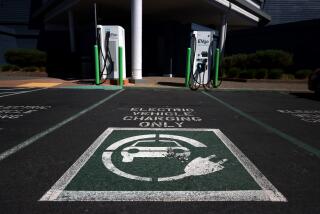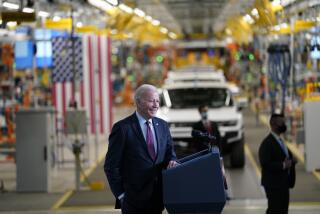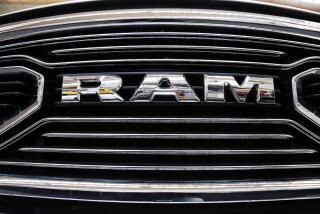Facing the political might of its auto industry, Germany balks at stringent measures to curb pollution from diesels
Reporting from Berlin — German government leaders and the country’s powerful car industry agreed Wednesday to a plan to install relatively inexpensive software updates on 5 million of the country’s most heavily polluting diesel cars.
The updates are expected to cost German carmakers $600 million — far less than the estimated $4.7 billion it would have cost had the government required far more effective mechanical modifications that environmentalists wanted.
The move comes as Volkswagen is struggling to recover from a massive emissions scandal in the United States and all automakers are facing increasing competition from hybrid and electric vehicles and pressure from other European countries to lower emissions.
Britain and France also recently announced they want to ban the sale of new diesel and gasoline-powered vehicles by 2040 while major European capital cities such as Athens and Madrid plan to ban all diesel vehicles within the next eight years.
Germany had considered banning diesels in heavily polluted cities. But a third of the country’s 45 million cars are diesels, and the automakers have enormous political and economic power, employing more that 800,000 workers.
With elections scheduled for next month, Chancellor Angela Merkel, her conservative party and its grand coalition partner, the center-left Social Democratic Party, were reluctant to attack the status quo.
Diesel cars, using an engine invented in the 19th century by Germany’s very own Rudolf Diesel, are popular in Germany and in many European countries because of state subsidies that make the prices of diesel fuel often substantially cheaper than gas.
Newer diesel cars will not have to undergo the software update.
The agreement emerged Wednesday from an “emergency diesel summit” in Berlin that included car industry executives, union leaders and governors from states with car factories.
Environmental groups vowed to press on with court challenges across the country that could still force some towns and cities to ban older, more heavily polluting diesel cars despite the software update.
Greenpeace demonstrators unfurled a giant banner on the Transport Ministry that read: “Welcome to Fort NOx” — a reference to the toxic nitrogen oxides from diesel fumes.
But summit participants praised the agreement as an anti-pollution measure that would not hurt the economy.
“What is at stake here is securing jobs in the car industry — and clean air in our cities,” said Horst Seehofer, the governor of Bavaria, a state that is home to BMW and Audi as well scores of car parts suppliers.
The agreement also made political sense for both major parties.
“No one in the German government has any interest or need for any kind of a car industry scandal right now or stirring up any problems for them or their suppliers,” said Thomas Jaeger, a political scientist at Cologne University. “They’re all happy to get it out of the way as quickly and painlessly as possible and the carmakers are happy that there won’t be any serious ramifications.”
Ferdinand Dudenhoeffer, a car industry analyst at the University of Duisburg-Essen Center for Automotive Research, called the agreement a farce and said that political leaders had squandered the opportunity to force a more meaningful change on the carmakers. “The biggest losers are the politicians and their credibility,” he said.
The only criticism from inside the meeting came from Environment Minister Barbara Hendricks of the Social Democrats. “This agreement doesn’t go far enough yet,” she said. “Software updates won’t completely solve the NOx problem from diesels.”
Once heralded around the world as paragon of high quality and efficiency, with the capability to race at speeds well over 100 mph, German cars have seen their image take a battering in recent years following revelations in 2015 that Volkswagen cheated on diesel emissions tests involving nearly 600,000 cars in the U.S.
“The car industry knows that we’ve lost a lot of the trust that we had,” said Matthias Wissmann, president of the VDA car industry lobby and a former transport minister. “We have to work hard at winning back that trust.”
The German carmakers, who long resisted electric vehicles while clinging to the internal combustion engine, have also been caught flat-footed by changes in the global car market, such as the launch of Tesla’s first mass-market electric car and Volvo’s announcement last month that all its new cars from 2019 will be partially or completely electric-powered.
The VDA said that the new engine management software would improve emissions filtering systems and reduce the nitrogen oxide levels by between 25% and 30%.
But Juergen Resch, head of the DUH environmental group, criticized the agreement and said it would reduce emissions of nitrogen oxide by only 2% to 3%. “This is bad news for hundreds of thousands of people who will get sick and 10,600 people who will die prematurely due to NOx each year,” Resch said.
Kirschbaum is a special correspondent.
UPDATES:
3:45 p.m.: This article was updated with details about the agreement and political analysis.
This article was originally published at 10:30 a.m.
More to Read
Sign up for Essential California
The most important California stories and recommendations in your inbox every morning.
You may occasionally receive promotional content from the Los Angeles Times.










